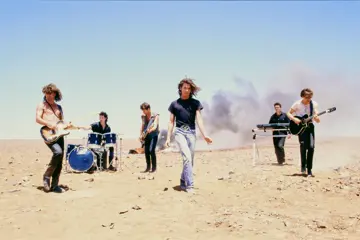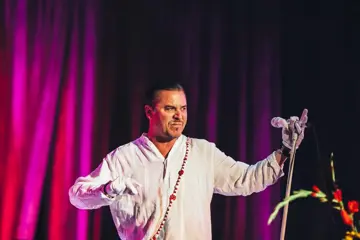"It isn't to be seen as a play about a man attacking a woman."
Andrew Henry is explaining the intense political overtones of Look Back In Anger as less an exploration of misogyny during the '50s and more an exploration of the impact of social and political turmoil on the masses — something he believes is more relevant to the audience than ever in the post-Brexit atmosphere.
"The play is well noted for its blatant misogyny. I think that can be very confronting for people. But I have to say that what is extraordinary about this play, by cutting through all of that, this play is extremely important… The anger that is felt throughout the world; this is ultimately a story about a very frustrated person who has grown up in a working class background and he's unable to provide the sort of life that his wife, from an upper class background, is deserving of. That means — as we know men do unfortunately so and all too frequently — he lashes out in different ways," Henry explains.
"As the Brexit thing unfolds, what you saw was a country savagely divided, savagely."
"As the Brexit thing unfolds, what you saw was a country savagely divided, savagely. What you saw in some of those interviews was just extraordinary because there was either absolutely for, absolutely against or just absolutely belligerent ignorance of the situation. And that ignorance, that divide, is the trigger for John Osborne when he wrote this play. He's talking about the difference between the working and the upper classes, when pretty much we can identify that division going on right now in the guise of what is a very complicated love story."
The history behind Osborne's play revolves around the movement of 'angry young men' — a collection of working, middle class playwrights who captured the British post-war social and political atmosphere through hyper-realism, rejecting the "high camp, high comedy" that characterised theatre at the time. Look Back In Anger is thought to be the instigator of this artistic disillusion with British society. "What happened was The Royal Court Theatre put on this play by this absolute unknown writer called John Osborne, and it was a completely new voice. It was in a dank, awful single room... this was a photograph of the working class at that point as they knew it in London," Henry provides. "The language that was used in the play — the hostility and the discussion of sex and the discussion of religion and the discussion of politics — so you can imagine 1956, after you've normally been seeing these wonderful big comedies, and then this play arrives. And it's a play that has a lot to say.
Don't miss a beat with our FREE daily newsletter
"Very famously, the chap playing Jimmy Porter was slapped in the face by an audience member on one of its first shows," Henry laughs at this history of his character. "The play itself is riddled with challenges because it was such a specific time in British history," confesses Henry. "There's a great quote, that John Osborne didn't just write a play, he set off a landmine that blew most of British theatre up... The climate that Australia has, and seems to still have and isn't going to go away any time soon... Right now, it's almost like, certainly in the time that I've had the play, this is the right time for it to have happened."















